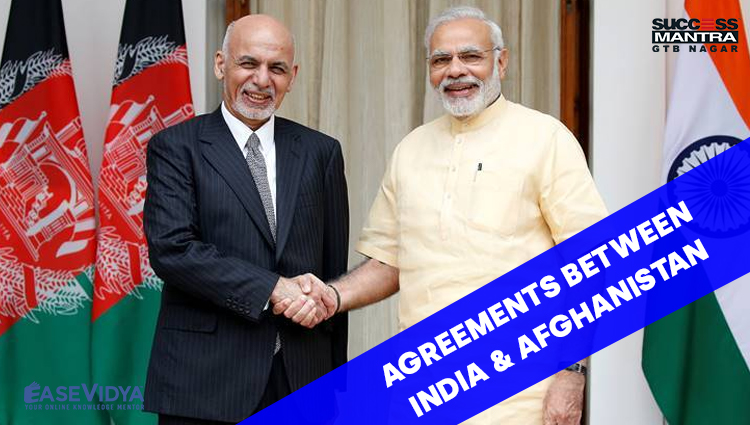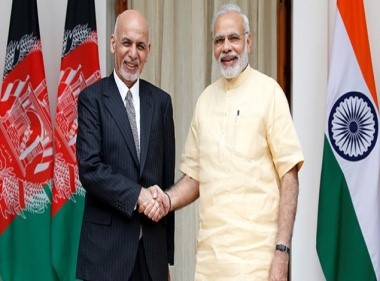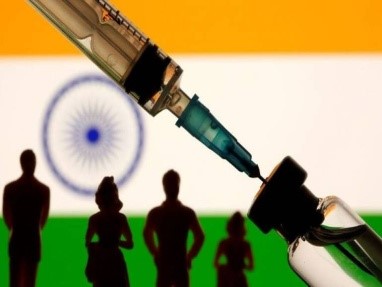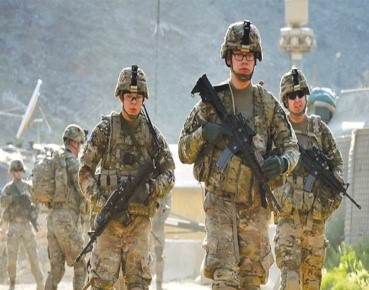
AGREEMENTS BETWEEN INDIA AND AFGHANISTAN
AGREEMENTS BETWEEN INDIA & AFGHANISTAN

Prime Minister Narendra Modi conducted summit-level talks with Afghanistan President Ashraf Ghani via video conferencing on February 9, 2021. During the meeting, PM Modi expressed concerns over the rising violence in Afghanistan and termed targeting of the civilians, journalists and workers by the terrorists a "cowardice act" and asserted that both India and Afghanistan want to see the region free of terrorism. PM Modi while stressing on the friendship between the two countries, said that India has always supported Afghan-led, Afghan-owned and Afghan-supported initiatives. He further stressed that unified Afghanistan can fight any calamities and success of the nation is the all-around success of India. Afghanistan President Ashraf Ghani thanked India and PM Modi for India's gift of water through the signing of an Shahtoot dam agreement and delivery of 5,00,000 doses of the COVID-19 vaccine. The Afghan President stated that India's attention to Afghanistan and its offer of the gift of life to Kabul and the people of Afghanistan symbolise the value of decency, democracy, humanity, mutual interest, mutual respect, mutual trust and our interdependent world.
Further, the Afghan President said that India's decision to provide them with 5,00,000 doses of the vaccine at this critical time when Indians themselves are looking for every single vaccine could not be a greater gift. He stated that the vaccines will be administered to their frontline health workers and heroic security forces and vulnerable people. With Shahtoot reservoir, we will be able to implement our vision of restoring natural beauty that captivated the imagination of Babur.
INDIA-AFGHANISTAN SIGNED MOU ON 'SHATOOT DAM'
The MoU was signed by Union External Affairs Minister Dr. Jaishankar and Foreign Minister Mr. Hanif Atmar, in the presence of PM Modi and the Afghan President. The Shahtoot dam is proposed to be constructed on the Kabul river basin, which is one of the five river basins of Afghanistan. Shahtoot Dam will provide clean drinking water to two million citizens of Kabul and will also be used to provide irrigation water to nearby areas, rehabilitate the existing irrigation and drainage network, aid in flood protection and management efforts in the area, and also provide electricity to the region. The project is a part of the New Development Partnership between India and Afghanistan. The Shahtoot dam is the second major dam being built by India in Afghanistan, after the India- Afghanistan Friendship Dam [Salma Dam], which was inaugurated by the Prime Minister and the President in June 2016. The signing of the Shahtoot Dam agreement is a reflection of India’s strong and long-term commitment towards the socio-economic development of Afghanistan. PM Modi during the talks highlighted the civilisational relationship between India and Afghanistan and gave an assurance of India's continued support for a peaceful, united, stable, prosperous and inclusive Afghanistan.
It is the moment for regional consensus and international consensus and for a guarantee of a stable and prosperous Afghanistan. He further urged the world and all stakeholders to respect the rules of sovereignty and international relations and stop giving sanctuaries and stop interfering in the affairs of their neighbours.
INDIA & AFGHANISTAN RELATIONSHIP

India’s Current Assistance : India will launch phase-IV of high-impact community development projects, which include around 150 projects worth USD 80 million. It has signed an agreement for building the Shahtoot dam, which would provide safe drinking water to 2 million residents of Kabul city. It builds on the 202 km Pul-e-Khumri transmission line of 2009, through which India provides power to the city.
Earlier Assistance: India’s development programmes in Afghanistan are focused around five pillars: Large infrastructure projects, Human resource development and capacity building, Humanitarian assistance, High-impact community development projects, Enhancing trade and investment through air and land connectivity. Since 2001, India has committed USD 3 billion towards rebuilding and reconstruction of Afghanistan. During the Taliban years from 1996 to 2001, India did not invest in Afghanistan. Chabahar Port in Iran, which provides alternate connectivity to Afghanistan. Afghanistan’s growth has been constrained by its landlocked geography and Pakistan blocking transit access made the situation even worse.
Pandemic Support: India sent more than 20 tonnes of medicines, other equipment and transported 75,000 tonnes of wheat to Afghanistan to address the Covid-19 challenge. The Indian government’s decision to invest in Afghanistan’s future, where the Taliban is set to play a dominant role, is being seen as a major departure from the past. India also participated in the commencement ceremony of the intra-Afghan talks in Doha in September 2020, where a 21-member Taliban team was also present. It reflects India's realisation of ground realities and shifting sands in Kabul’s power structure.
REDUCTION OF TROOPS BY USA

In February 2020, the USA and the Tabilan signed an agreement in Doha, (Qatar’s capital). According to it, the USA would withdraw all of its troops from Afghanistan in 14 months and would also release Taliban prisoners, held captive by the Afghan government. In return, the Taliban assured that they would not allow transnational jihadist organisations such as al-Qaeda and the Islamic State to use Afganistan as their base and also committed to start direct talks with the Afghan government, which began in September 2020.
With the USA leaving at such a crucial point, it not only deprives Afghan forces of the support they need, particularly the airpower, but also affects their morale. The North Atlantic Treaty Organization (NATO) has committed to funding Afghan troops for four more years. However, this decision will leave Afghanistan with an uncertain future as the Taliban is expected to take over after the troops’ withdrawal. The Taliban, who were ousted from power in 2001 after the USA invasion, have since been fighting both foreign troops and the Afghan government. It now controls more than half of the country and contests the whole of it. Since the agreement was signed, the Taliban have conducted more than 13,000 attacks nationwide. According to a UN Assistance Mission in Afghanistan (UMAMA) report in October 2020, nearly 6,000 Afghan civilians were killed in the first nine months of the year and 45% of the deaths were by the Taliban.
BACKGROUND
Union External Affairs Minister Dr. S Jaishankar had announced at the Geneva Donors Conference in November 2020 that India will be constructing the Shahtoot Dam on the Kabul river in Afghanistan. Along with this dam, India has pledged to rebuild Afghanistan committing to USD 80 million worth of projects. Around 150 projects have been announced by India in the conflict-ridden country. Overall, India has completed a large number of infrastructure projects in Afghanistan, including the construction of the Salma Dam, the Afghan parliament building, which was inaugurated in 2015 and a 218-km road from Delaram to Zaranj along the Iranian border to provide alternative connectivity for Afghanistan through Iran.
QUESTIONS 1-5
Q.1 Which of the following statements is/are correct in the context of the MoU recently Signed between India & Afghanistan?
- President Ashraf Ghani thanked India and PM Modi for India's gift of water through the signing of an Salma dam agreement and delivery of 5,00,000 doses of the COVID-19 vaccine.
- The project is a part of the New Development Partnership between India and Afghanistan.
- Only I follows
- Only II follows: ANSWER
- Both I & II follows
- None of the above
Q.2 The MoU was signed between which of the following Ministers of the India & Afghanistan?
- Jaishankar & Mohammed Haneef Atmar: ANSWER
- Rajnath Singh & Asadullah Khalid
- Jaishankar & Asadullah Khalid
- Rajnath Singh & Mohammed Haneef Atmar
Q.3 Consider the following statements in the context of the relationship between India & Afghanistan and state which of the following is incorrect?
- Chabahar Port in Iran, which has strategic importance to India also provides alternate connectivity to Afghanistan.
- Shahtoot Dam is the first major dam built by India in Afghanistan: ANSWER
- Afghanistan is a gateway to the oil and mineral-rich Central Asian republics.
- None of the Above.
Q.4 One of the most historic deal between US & Taliban which ended 18-year War in Afghanistan is also termed as?
- Kabul Agreement
- Sharjah Agreement
- Doha Agreement: ANSWER
- Tehran Agreement
Q.5 Which of the following is among the several projects of India in Afghanistan?
- Construction of the Parliament building.
- Construction of the Pul-i-Khumri to Kabul power line.
- Salma Dam power project
- All of the above: ANSWER












0 Comment